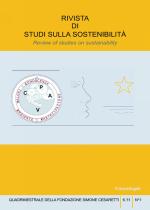Article PDF (0.13 Mb)
Compatible only with Adobe Acrobat Reader (read more)
Textile industry sustainability : Unpacking the potential of EPR for circular practices
87-102 p.
This paper explores the potential of Extended Producer Responsibility (EPR) systems to enhance sustainability in the European textile industry, which is both economically significant and environmentally impactful. EPR assigns lifecycle responsibility to producers, encouraging sustainable design and waste management. The paper compares the centralized monoconsortium model, exemplified by Franceìs Refashion Consortium, with Italy's emerging multiconsortium approach. While monoconsortiums offer centralized control, multiconsortiums promote competition and innovation. The success of EPR in driving circularity in the textile sector depends on context-specific policies that engage all stakeholders. [Publisher's Text]
-
Articles from the same issue (available individually)
-
Information
ISSN: 2239-1959
KEYWORDS
- Extended Producer Responsibility (EPR), textile waste management, circular economy, mono-consortium system, multi-consortium system


